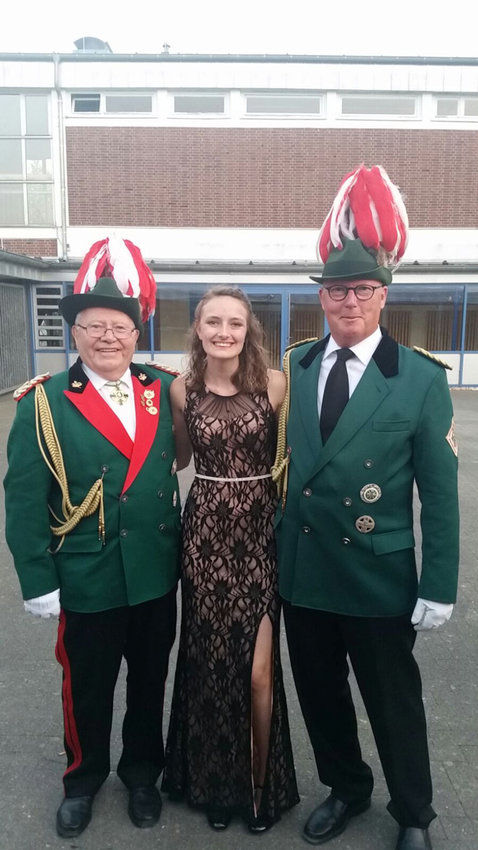 Natalie Bessinger, left, with her 9-year-old host sister, Helen, visiting a zoo together in the Netherlands. Courtesy Natalie Bessinger
Natalie Bessinger, left, with her 9-year-old host sister, Helen, visiting a zoo together in the Netherlands. Courtesy Natalie Bessinger
Natalie Beesinger, of Lakebay, and Mika Laursen, of Wauna, both 17, returned home in June after spending their high school junior years in Germany as part of a student exchange and scholarship program.
Last year, Beesinger and Laursen were two of 250 students chosen out of 3,000 applicants nationwide to receive the 2016 Congress-Bundestag Youth Exchange Scholarship (CBYX).
Beesinger lived with a host family of five in Herzogenrath, a town of 50,000 bordering the Netherlands.
“It’s only been two weeks, but I really want to go back,” she said.
“It feels like it’s been four months,” Laursen said. “I’m new to everything here.”
While Beesinger has lived in Lakebay for more than a decade, Laursen is a newcomer to the KP; she was living in Buckley when she won the scholarship. Her family relocated to Wauna just a few days before her departure.
“I was so excited,” she said. “I had never left the country, ever, and I lived 20 minutes from Canada.”
Both students felt ready, but said nothing can really prepare one for living in a foreign country.
“No matter what you think it’s going to be like before you go, you’re not ready,” Beesinger said. “I was just in that state of nervous excitement: ‘This is so cool, but I am so alone.’”
Adjusting to a new family was also a challenge.
“It was a complicated relationship,” Beesinger said. “My host family never helped me with German; they would just tell me it was bad. I had a rough time with that.”
Laursen lived with a family of six in Eschweiler-Huecheln, across the city of Aachen from Beesinger.
“My host family was so great,” Laursen said. “I could tell people my name and that was it, but I was really lucky because my host family could speak mediocre English—even the 4-year-old.”
School was another matter, she said.
“My English teacher gave me a B,” Laursen said. “And I’m like, ‘How did I get a B in English?’”
“My school was awesome,” Beesinger said. “They were all really nice to me, but for a couple of months some of the teachers didn’t get that I couldn’t really speak the language or spell. It’s hard to explain to a teacher that you can’t read.”
Their schools taught fifth grade to 12th and had between 750 and 1,000 students. Both Beesinger and Laursen took classes with refugees.
 Mika Laursen with two celebrants at the Schützenfest Verein, an annual festival in Aachen that includes a shooting competition. Laursen won third place in the jungend division (ages 14 to 25). Courtesy Mika Laursen
Mika Laursen with two celebrants at the Schützenfest Verein, an annual festival in Aachen that includes a shooting competition. Laursen won third place in the jungend division (ages 14 to 25). Courtesy Mika Laursen
“I met a lot of refugees from many countries,” Laursen said. “They were all kids. It was really cool. But I heard people say, ‘Get those Syrians out of here.’ There were even conflicting opinions in my household.”
“I saw some stuff,” Beesinger said. “I had a lot of refugee friends from language class and they were all adults. I think racism is probably just as bad there (Germany), but maybe they hide it better.”
The two students also had similar experiences when it came to societal attitudes that are potentially awkward in the U.S.
“My host parents were very upfront about politics,” Laursen said, “But they talked about American politics, not German politics. And they were not happy with us.”
“I feel like socialism is a dirty word in America but in Germany, it works,” Beesinger said. “Maybe it’s because it’s a smaller country.”
Both students said Germans their age were more responsible with alcohol and sex than their American counterparts.
“They’re allowed to be around alcohol their whole lives, even though they’re not allowed to drink hard stuff until they’re 18; there’s no taboo,” Beesinger said. “Kids here feel when they get one chance to drink alcohol, they have to drink as much as possible. I would be around other Americans and think, ‘How are you still alive?’”
The German attitude was similar when it came to romantic relationships.
“As far as sex goes, I think they’re a lot more accepting of it and they do have a much lower teen pregnancy rate (than the U.S.) because the communication is so much better,” Beesinger said. “In Germany, if something goes wrong (in a relationship), you can talk to people and you’re not going to get shamed for it.”
“I witnessed multiple conversations between my host siblings, the older ones, and my host mom just talking about their sexual relationships,” Laursen said. “I mean, they just talk about it.”
Both students will be seniors next year at Peninsula High School.
“I need to get a job,” Beesinger said. “I want to save up money to go back. We both want to go to college there.”
“They have international programs, so they want kids from other countries to come,” Laursen said. “It’s much less expensive. They don’t have tuition; they have a student body fee, which is 260 euros a semester for insurance and transit.”
The CBYX scholarship was founded in 1983 to strengthen ties between Germany and the U.S. through citizen-level diplomacy. Both Beesinger and Laursen recommended the experience.
“But they have to know that the program is not going to hold their hands through everything,” Laursen said. “They’re going to expect you to do stuff yourself: ‘You’re an adult now—get it done.’”
“It gave me a taste almost of what college would be like, but with the safety net,” Beesinger said. “I’m excited to move out, but I feel like sometimes my mom gets kind of hurt when I say that.”
UNDERWRITTEN BY THE FUND FOR NONPROFIT NEWS (NEWSMATCH) AT THE MIAMI FOUNDATION, THE ANGEL GUILD, ADVERTISERS, DONORS AND PEOPLE WHO SUPPORT INDEPENDENT, NONPROFIT LOCAL NEWS